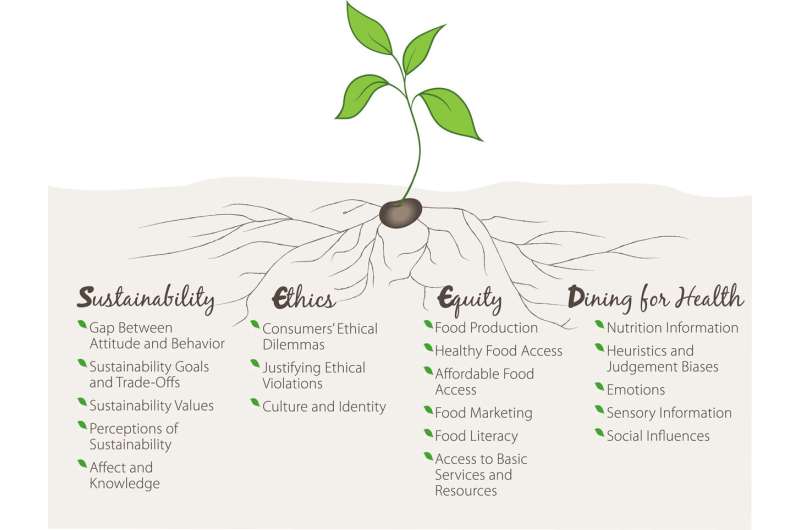This article has been reviewed according to Science X's editorial process and policies. Editors have highlighted the following attributes while ensuring the content's credibility:
fact-checked
peer-reviewed publication
trusted source
proofread
The power of plants and how they are changing the way we eat and live

Plant-based eating and veganism have been around for decades, but more people are choosing plant-based diets than ever before. Plant-based eating means eating more fruits, vegetables, nuts, grains and beans while eating less or no meat, dairy or animal products. A UNM business school researcher has studied the reasons behind this trend.
Lama Lteif, an assistant professor of marketing at the UNM Anderson School of Management, in her 2023 article, "Plant Power: SEEDing our Future with Plant-based Eating," shared a new way to look at why people are choosing plant-based diets and the benefits of this shift. She built on data from the 2021 Rockefeller Foundation report to explain people's food choices. Her work features a framework showing the values that drive consumers toward plant-based eating. The framework is called SEED: Sustainability, Ethics, Equity and Dining for Health.
Plant Power is the first research article of its kind, "because it is at the intersection of consumer health and the climate crisis. Understanding the reasons that drive consumers to choose a plant-based diet is good for people and the environment," said Lteif.
The SEED Framework
As more people relate to the values in the SEED framework, they are changing their food habits to reflect these beliefs.
"By understanding how these values influence decision-making, individuals and marketers alike can make better choices for themselves, inform their marketing strategies, and give more attention to the issues that mean the most to them," Lteif explained.
Those who relate to the Sustainability value have growing concerns about animal farming and its role in climate change. People have learned that eating less meat can reduce their carbon footprint and help ease the effects of global warming.
Next, Lteif explained that a person's belief system, or code of Ethics, can also affect their eating choices. Within this group is a growing concern for animal safety and well-being during meat and dairy production. Animal handling practices can include cramped living conditions, overcrowding or inhumane treatment. By not eating these foods, those holding this value hope to show their concern and support better animal treatment.
Food Equity refers to offering all people affordable access to food and the ability to cook and store the food that allows them to thrive. There is a growing awareness that many people do not have access to plant-based food or the means to keep it fresh. More so, underserved communities, including communities of color, often have less access to healthy, affordable, plant-based foods. Improving access can improve people's health and well-being by eating more healthy foods and allowing them to make choices that reflect their values.
Lastly, the Dining for Health value supports the connection between food and health. A plant-based diet is rich in fiber, vitamins, minerals and antioxidants, which help improve gut health and absorbing of nutrients that support the immune system. Because of this, a diet that is rich in fruits and vegetables can help reduce the risk of certain cancers, type 2 diabetes, heart disease and more.
Plant-based eating and its impact on the future
Lteif, a former nutritionist, combines her passion for helping others make healthy food choices with a curiosity about the drivers behind people's eating choices. She likens these value-based choices to a seed's root system, where the "SEED values connect and as a group can influence a person's eating habits. If embraced by society as a whole, these values can transform systems to be more friendly to our environment, more fair and more nourishing."
Lteif explained that Gen Z, those aged 35 and younger, are leading the way with alternative food choices due to their concerns about climate change and the environment. She believes learning more about the other value groups and the reasons keeping others from making healthy food choices is important. She would also like to explore ways to encourage more people to adopt a plant-based diet.
A great benefit of eating more fruits and vegetables is more demand for restaurants, grocery stores and eateries that offer vegan-friendly options. This increase in offerings makes it easier for people to make healthier choices today than ever before.
The work is published in the Journal of Consumer Psychology.
More information: Melissa G. Bublitz et al, Plant power: SEEDing our future with plant‐based eating, Journal of Consumer Psychology (2022). DOI: 10.1002/jcpy.1328
Journal information: Journal of Consumer Psychology
Provided by University of New Mexico




















